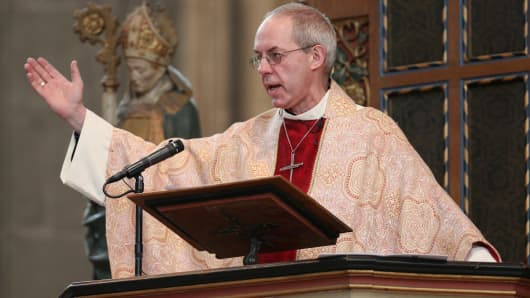The Archbishop of Canterbury discovered that last week when his attempt to take on controversial pay-day lender Wonga exposed the Church of England to accusations of hypocrisy.
But that shouldn't deter the Church from rooting out corporate injustice. Even if sometimes it garbles the gospel of ethical capitalism.
Justin Welby locked horns with Wonga because the company's exorbitant interest charges attract legitimate concerns. What came next was the "very embarrassing" revelation that the Church is indirectly a financial backer to Wonga.
(Read more: Church of England invests in Wonga backer)
That was clearly a bruising experience for the Church - but it shouldn't quell its appetite to speak up. After all, the Church is the ultimate long-term investor, at a time when the government is trying to encourage more shareholder stewardship.
The trouble is that wherever you look, there are pitfalls to ethical investment - something that says as much about the myriad ways companies can cross moral boundaries as is does of the Church's stock-picking prowess. In fact, no sooner had Welby pledged to review the Church's investment strategy, than David Cameron and his advisers were urging him to cut ties with Google in order to persuade the search engine to block illegal images of child abuse.
(Read more: Church vs. payday lenders - whose side is God on?)
Almost everything from tax avoidance to environmental failings are a potential banana skin for the Church. So if Welby really wants to extend his sermonizing into corporate investment, he is going to have to be far more vigilant.
As he should have known, this is not the first time the Church has been wrong-footed by its forays into moralizing on the world of trade and investment.
In the aftermath of Lehman Brothers' collapse and the emergency rescue of HBOS, the Archbishop of York, Dr John Sentamu, described hedge fund short-sellers as "bank robbers and asset strippers". At almost exactly the same time, the then Archbishop of Canterbury, Dr Rowan Williams, condemned the "basic unreality" of the global trade in debts.
(Read more: Vatican Bank Director, Deputy Resign Amid Scandal)
They had tapped into the moral outcry over speculative short selling pushing banks to the brink of collapse. How unfortunate then that the Church was shown to have invested in hedge funds that shorted bank stocks in lenders all across the world, while it was also exposed as an active lender of stock - the way financiers conduct such shorting trades.
According to its latest accounts, The Church of England still lends out £37.8 million ($57.8 million) in stock. It has also increased its allotment to hedge funds as part of its £5.3 billion ($ 8.1 billion) of invested capital.
Among its biggest bets, the Church Commissioners, who manage the Church's assets, also ploughed money into HSBC, which last year paid a heavy settlement for claims it helped two Mexican drug cartels launder money.
(Read more: UK Banking Commission Findings 'May Be Ignored')
Pharmaceutical giants Glaxosmithkline and Astrazeneca were also among its top investments - both are currently under investigation in China for alleged wrongdoing.
Just over £991 million ($ 1.5 billion) of the Church's money is held in U.K. equities with £1.5 billion ($2.3 billion) invested in oversees stocks. Miners like Rio Tinto and BHP Billiton as well as Oil and Gas majors BP and Shell are listed in the accounts. The Church, like any asset manager has to produce returns, and according to it its latest accounts the commission raked in 5.7 percent to help fund its £1 billion ($1.53 billion) annual running bill.
But while making healthy returns is vital for any fund, the ambition to encourage a more responsible type of capitalism should be kept in focus, even when it's a challenge to fulfill. Even for the Church, it can be tough to tell right from Wonga.
Follow Helia on Twitter: @heliaebrahimi.


